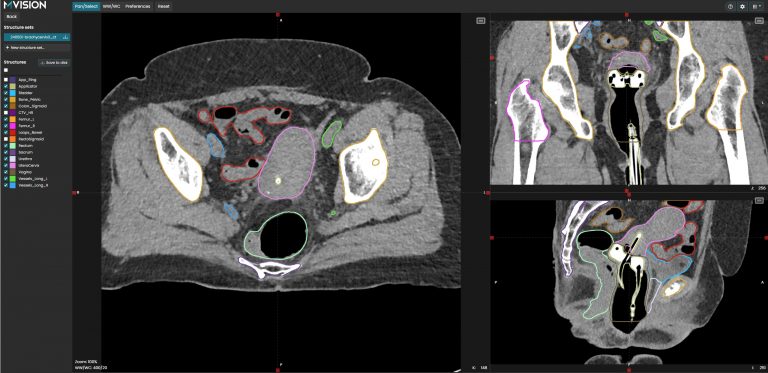World Kidney Cancer Day is observed every year on the second Thursday of June. “Listening” is this year’s theme, which refers to the benefits of shared decision making, patient’s empowerment to seek a second opinion and creating awareness around misinformation and how to check if sources are reliable (1).
More than 400 000 people are diagnosed each year with kidney cancer (2). Depending on the stage in which the disease is diagnosed, surgery and systemic therapies have important roles for achieving the best possible result. Kidney cancer was long considered as a “radioresistant” tumor, but the different mechanisms of action of high doses per fraction seem to overcome this resistance.
According to the updated NCCN guidelines, the SBRT is considered an ablative technique and may be recommended for medically inoperable patients (not optimal surgical candidates) with stage I, II and III kidney cancer.
For stage IV, if it’s an oligometastatic kidney cancer, or at relapse, if oligometastases develop after a prolonged disease-free period, it may be used as an alternative to surgery (3).
Other radiotherapy modalities were shown to improve pain caused by bone metastases (4,5).
Based on the current evidence, an interesting treatment decision algorithm for older patients with non-metastatic kidney cancer who are unfit for surgery or decline nephrectomy was recently proposed by the International Geriatric Radiotherapy Group. Based on tumor size, histology type and PD-L1 status, different approaches could offer improved efficacy and optimal balance between benefit and toxicity risk (6).
Each patient is different in cancer type and clinical context, so refining and personalizing therapies is more than a natural trend, it becomes a necessity. Fortunately, the solutions for adapting the treatments are smarter than before. MVision AI supports clinicians to adapt the treatment planning using multiple structures which are accurate, guideline-compliant and fastly delivered. Modern technology, artificial intelligence and human touch contribute to improve survival of cancer patients, including for those who have been diagnosed with kidney cancer.
References
- International Kidney Cancer Coalition. 2024 Word Kidney Cancer Day. Accessed on 19 June 2024. Available at: https://ikcc.org/world-kidney-cancer-day/
- Globocan 2022 factsheet. Accessed on 17 June 2024. Available at: https://gco.iarc.who.int/media/globocan/factsheets/populations/900-world-fact-sheet.pdf
- NCCN Clinical Practice Guidelines in Oncology. NCCN Guidelines®) for Kidney cancer. Version 4.2024 © 2024. © National Comprehensive Cancer Network, Inc. 202X. All rights reserved. Accessed 19 June 2024.
- Hunter GK, Balagamwala EH, Koyfman SA, et al. The efficacy of external beam radiotherapy and stereotactic body radiotherapy for painful spinal metastases from renal cell carcinoma. Pract Radiat Oncol 2012;2:e95-e100. Available at: https://www.ncbi.nlm.nih.gov/pubmed/24674192.
- Zelefsky MJ, Greco C, Motzer R, et al. Tumor control outcomes after hypofractionated and single-dose stereotactic image-guided intensitymodulated radiotherapy for extracranial metastases from renal cell carcinoma. Int J Radiat Oncol Biol Phys 2012;82:1744-1748. Available at: https://www.ncbi.nlm.nih.gov/pubmed/21596489.
- Nguyen NP, Chirila ME, Page BR, et al. Immunotherapy and stereotactic body radiotherapy for older patients with non-metastatic renal cancer unfit for surgery or decline nephrectomy: practical proposal by the International Geriatric Radiotherapy Group. Front Oncol. 2024;14:1391464. Published 2024 May 24. doi:10.3389/fonc.2024.1391464



